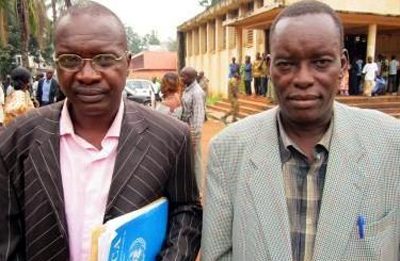New York, July 12, 2011– Two Central African Republic journalists were fined and released from custody Monday after being jailed for weeks in connection with their coverage of public protests by retired military officers who say the government failed to direct European Union funds to them as intended, according to news reports and local journalists.
Judge Jules Gavo convicted Faustin Bambou, editor of the weekly Les Collines de l’Oubangui, and Cyrus Emmanuel Sandy, editor of the daily Médias, on charges of defamation under the 2005 press law. He fined them 300,000 CFA francs (US$635) apiece. The journalists told CPJ they intend to appeal.
The prosecution had sought three-year prison terms and fines of 1 million CFA francs on the original charges of “inciting hatred” and “endangering the security of the state,” according to news reports. The case was based on a complaint by Defense Minister Jean Francis Bozizé, a son of President Francois Bozizé, over coverage of ongoing public protests by hundreds of retired officers of the military and military police. The officers claim they have not received any of 5.15 million euros (US$7.2 million) in retirement and investment funds earmarked for them in a 2009 agreement between the former EU ambassador to the Central African Republic, Jean-Claude Esmieu, and Defense Minister Bozizé. The European Union is the Central African Republic’s main financial backer.
“We welcome the release of our colleagues Faustin Bambou and Cyrus Emmanuel Sandy who were jailed on outrageous charges of inciting hatred and endangering state security for reporting the grievances of retired members of the security forces,” said CPJ Africa Advocacy Coordinator Mohamed Keita. “We call on the appeals court to overturn their convictions on charges of defamation.”
Bambou, who was jailed for 43 days in 2008 over a story alleging public corruption, was arrested on May 27 over four stories he published beginning in February over the retired security forces’ grievances, he told CPJ. Sandy was picked up on June 20 over two stories on the protests in April and May, he told CPJ.
Both the United Nations and the European Union have expressed concerns about the Central African Republic’s democratization process. More than 60 percent of the population subsists on less than $1.26 daily, according to U.N. data, despite abundant wealth in natural resources, including uranium, timber, and diamonds.
